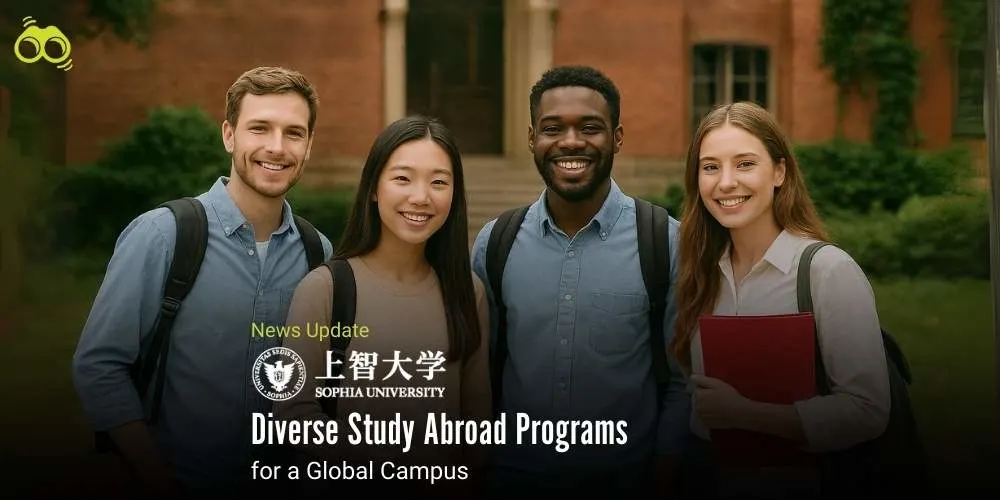Sophia Strengthens Study Abroad Support to Boost Global Engagement
Professor Mariko Iijima Leads Sophia’s Push for Internationalisation
Sophia University has long been recognised for its leadership in advancing internationalisation, both within Japan and on the global stage. In April 2025, Professor Mariko Iijima was appointed Vice President for Global Academic Affairs, a role through which she seeks to deepen the university’s commitment to global engagement, particularly by enhancing study abroad programmes and support systems for students pursuing education overseas.
Professor Iijima explained that one of her principal responsibilities is to strengthen the support network for outbound students. As of May 2025, Sophia University has established exchange agreements with 346 partner institutions across 64 countries. While the university welcomes approximately 700 international exchange students annually, only around 400 of its own students choose to study abroad. In light of this, she emphasised the importance of reinforcing the overseas study framework to ensure students feel confident and well-supported when undertaking such opportunities.
Currently, the university’s Centre for Global Education and Discovery offers tailored assistance, including a 24-hour crisis management service for students abroad. Nevertheless, Professor Iijima acknowledged that the institution lacks a comprehensive understanding of students’ lived experiences during their time overseas. To address this, she hopes to introduce a system whereby returning students can share their personal narratives, highlighting challenges, achievements, and reflections—with faculty, peers, and prospective participants. By encouraging students to document their journeys through photos, videos, or presentations, Sophia aims to remain connected to its global learners while inspiring others to follow similar paths.
Reflecting on her own academic trajectory, Professor Iijima noted that although she studied English at Sophia University, she did not participate in undergraduate exchange programmes. Instead, she pursued postgraduate studies in the United Kingdom, at a time when year-long placements were standard and often perceived as daunting. Today, however, students benefit from a broader spectrum of international education opportunities, ranging from semester exchanges and short-term language courses to overseas internships, training schemes, and socially engaged global studies projects. In her view, this diversity makes Sophia an increasingly attractive global campus. Professor Iijima further emphasised that education abroad should not be viewed merely as a means of improving language skills. Rather, it offers students the chance to immerse themselves in unfamiliar cultural settings, engage with diverse perspectives, and develop resilience through independent problem-solving. She shared that her own time abroad, during which she formed lasting friendships with peers from around the world, continues to shape her research and professional outlook.
While some students remain hesitant or uncertain about the value of studying abroad, Sophia University’s Yotsuya Campus already reflects a cosmopolitan ethos. With conversations in multiple languages heard daily, the campus embodies the vibrancy of a truly global learning environment. Professor Iijima hopes this atmosphere will encourage students to engage more actively with international education and to explore scholarship opportunities that can help alleviate financial barriers. By cultivating an inclusive, globally engaged academic community and offering robust support for overseas study, Sophia University is not only expanding access to international exchange programmes but also fostering the intercultural competencies essential for navigating an increasingly interconnected world.
Editor’s Note
Under the guidance of Professor Mariko Iijima, Vice President for Global Academic Affairs, Sophia University is evolving its approach to global education. This demonstrates the institution's enduring commitment to internationalisation and its renewed dedication to boosting study abroad participation, enhancing student support, and fostering intercultural engagement. Through exchange programmes, internships, and global studies projects, students gain exposure to diverse cultural contexts, develop resilience, and cultivate the global competencies increasingly valued in today’s interconnected world. Professor Iijima’s emphasis on personal growth, rooted in her own overseas journey, reinforces the idea that international education shapes not only careers but character. Despite having 346 partner institutions and welcoming 700 international students annually, only 400 Sophia students currently study abroad. This gap highlights the need for stronger institutional frameworks, including post-return storytelling initiatives and expanded financial support. The proposal to collect student narratives is particularly compelling, offering a way to build community, share lived experiences, and inspire future participation. Moreover, the presence of a vibrant international student body on Sophia’s Yotsuya Campus reflects the university’s cosmopolitan ethos. Yet, as Professor Iijima rightly notes, proximity to diversity is not a substitute for immersive engagement. Encouraging students to take active steps, whether through short-term programmes or full exchanges, will be essential in realising the university’s global vision.
Skoobuzz highlights that Sophia University’s evolving strategy serves as a model for how universities can nurture globally minded graduates equipped to lead with empathy, adaptability, and insight.














0 Comments (Please Login To Continue)